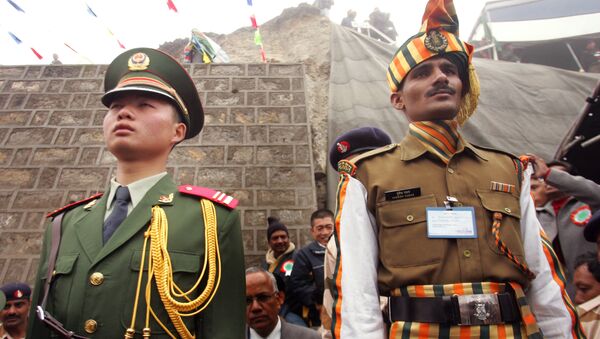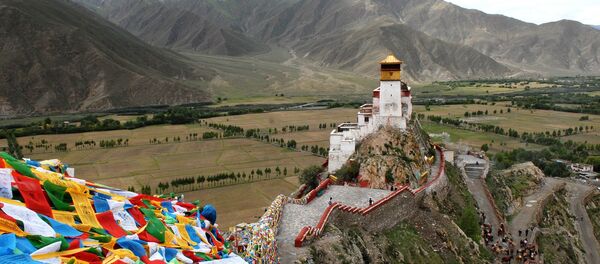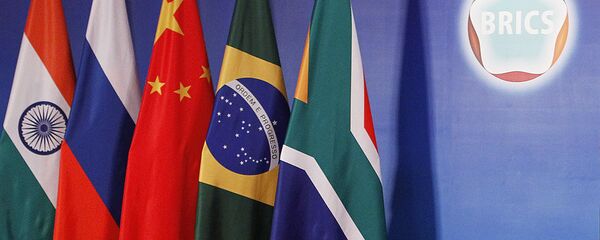Tensions between the world's two most populous countries over a narrow plateau of disputed territory on the China-Bhutan border threaten to enter a third month, with a senior Chinese Defense Ministry colonel warning Indian troops to withdraw from territory or 'face war' Tuesday. A day earlier, Chinese President Xi Jingping stressed that while China never seeks "aggression or expansion," it would not tolerate any attempts to "split any part of Chinese territory."
Delhi has showed no intention of backing down. On Wednesday, Indian media reported that Delhi would not make a reduction in troop strength in the disputed area.
India maintains that the territory, known as 'Doklam' in India and 'Donglang' in China, belongs to Bhutan, and that China's recent effort to build a road in the area violates a 2012 agreement and significantly alter the status quo.
Commenting on the war of nerves, which shows no signs of abating as both sides entrench their claims, Rossiya Segodnya political observer Dmitri Kosyrev wrote that there is only one global power which stands to benefit from a Chinese-Indian conflict.
"The golden dream of US foreign policy — a conflict between India and China, seems to be coming true, if not as a hot war then at least a war of nerves," the journalist wrote. The standoff over this slice of desolate territory in the Himalayas, difficult to even find on a map, has led many observers to ponder the changing state of the world, "and why this new world should include a quarrel between India and China."
"For China, the problem is roughly the same, and comes down to the question of how to get out of this essentially accidental conflict without losing prestige as one of the world's two superpowers," Kosyrev added.
"The border in question is situated at an altitude of four kilometers above sea level, and remains frozen to its core eight months out of the year. No one ever bothered to mark it down to the millimeter. On Chinese maps, it is designated as China; Bhutan, it turns out, does not think this is the case."
It was significant, the journalist stressed, that "along the whole area of the Indian-Chinese border passing through the Himalayas, a multitude of areas are contested. Therefore, it does not matter where the border incident occurred. What is important is how to resolve it." And this is not a matter for the military, but for foreign policy thinkers, according to the observer.
"The only thing that all analysts can agree on is that neither country needs a war, in which in on sense or another, both would be the losers."
"In addition," Kosyrev noted, "China would lose with its plans to create its 'One Belt, One Road' infrastructure initiative," since war and instability in the region is exactly the opposite of what it needs for its grand trade project to be a success.
"And if an accidental war on the frozen and barren territories in the Himalayas is not needed by its participants, who needs it?" the journalist asked. In such cases, he noted, the usual suspect is Washington, although even here debates have emerged, particularly in the Indian media.
"Another (this time a disillusioned Indian) complained to his readers that Washington did not react at all to the Himalayan incident." He added that US policy toward India for years on end has come down to both countries voicing their concern about the growing influence of China, but little else, with the Trump administration not caring to even appoint a new ambassador to the country six months into his term.
In short, Kosyrev wrote that the end of the current Himalayan conflict is not difficult to predict: "It will end with peace, of course. In a recent article, Shashi Tharoor, the man who almost became the UN Secretary General recently…enumerated all the areas in international affairs where Indian and Chinese interests coincide."
This includes cooperation through the East Asia Summit, the countries' membership in the Shanghai Cooperation Organization, joint work in forums devoted to climate change and environmental protection, and similar views on the need to promote population control, combat transnational crime, control the spread of disease and deal with non-traditional threats to security. According to Tharoor, the countries have vast untapped potential for supporting one another in areas from anti-piracy, to nuclear disarmament, human-trafficking and natural disasters.
Together, the diplomat noted, India and China can "take joint responsibility and contribute to the establishment of new rules in the global system. Both India and China have been rule-takers in the international system and are ready to be rule-makers."
"Indeed, it would be interesting if this skirmish high among the Himalayan mountains were to create a new situation in Asia, where it becomes crystal clear that the interests of China and India coincide almost everywhere and in everything. At a minimum, the conflict has shown that there is no rational basis for enmity between the two neighbors," the journalist concluded.





